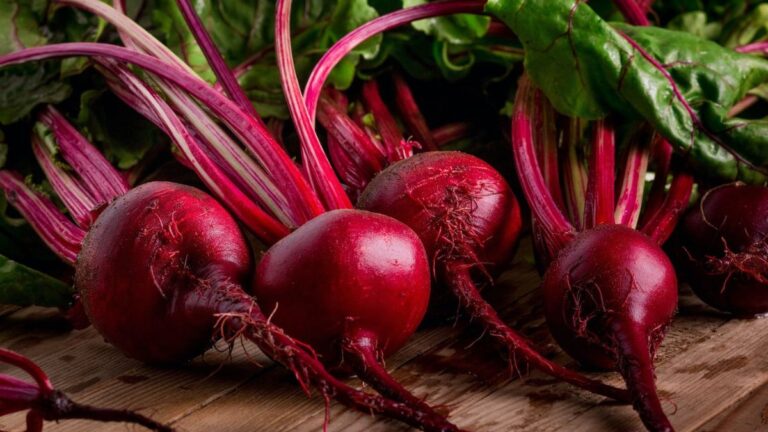Nutritional Profile
Beetroot is low in calories and high in essential nutrients:
- Vitamins: Beetroots are rich in vitamin C, which supports the immune system and skin health. They also contain B vitamins, including folate (vitamin B9), which is important for cell function and DNA synthesis.
- Minerals: They provide important minerals such as potassium, which helps regulate blood pressure, and manganese, which supports bone health and metabolism.
- Fiber: Beetroots are a good source of dietary fiber, which aids in digestion and helps maintain healthy bowel movements.
- Antioxidants: They contain antioxidants like betalains, which give beetroots their distinctive color and help combat oxidative stress and inflammation.
Health Benefits
- Heart Health: Beetroots are known to support cardiovascular health. The nitrates in beetroots can help lower blood pressure by relaxing blood vessels and improving blood flow. This can reduce the risk of heart disease and stroke.
- Improved Exercise Performance: The nitrates in beetroots can also enhance athletic performance by improving stamina and endurance. They help increase the efficiency of mitochondria, the energy-producing components of cells.
- Beetroot is a vibrant, nutrient-rich vegetable with several health benefits, and its impact on sexual health can be quite positive. When considering its effects alongside medications like Cenforce 100, Fildena 100, and Vidalista it’s important to understand how beetroot may influence your overall health and how it interacts with these medications.
- Digestive Health: The dietary fiber in beetroots supports healthy digestion by promoting regular bowel movements and preventing constipation. Beetroot fiber also supports the growth of beneficial gut bacteria.
- Anti-Inflammatory Properties: Beetroots contain betalains, which have anti-inflammatory properties. This can help reduce inflammation in the body and may benefit conditions such as arthritis.
- Detoxification: Beetroots support the body’s natural detoxification processes. They help the liver process and eliminate toxins, which contributes to overall health and well-being.
- Blood Health: Beetroots are a good source of iron, which is essential for the production of red blood cells. They also contain folate, which is important for the formation and maintenance of new cells.
- Cognitive Health: Some studies suggest that the nitrates in beetroots may improve cognitive function by enhancing blood flow to the brain. This can support brain health and potentially reduce the risk of cognitive decline.
Culinary Uses
Beetroot is highly versatile in the kitchen:
- Raw: Grated or sliced raw beetroot can be added to salads for a crunchy texture and vibrant color.
- Roasted: Roasting beetroots brings out their natural sweetness. Simply cut into wedges, season, and roast until tender.
- Juiced: Beetroot juice is popular for its health benefits and can be combined with other fruits and vegetables.
- Soups: Beetroot is a key ingredient in traditional soups like borscht, as well as other vegetable soups.
- Pickled: Pickled beetroots can be a tangy addition to salads and sandwiches.
Varieties of Beetroot
There are several varieties of beetroot, each with its own flavor and color:
- Red Beetroot: The most common variety, known for its deep red color and sweet flavor.
- Golden Beetroot: Has a milder flavor and bright yellow color.
- Chioggia Beetroot: Also known as candy cane beetroot, it has distinctive pink and white stripes and a sweet taste.
Environmental Considerations
Beetroot cultivation generally has a lower environmental impact compared to some other crops, but factors such as pesticide use and water consumption should be considered. Opting for organic or locally grown beetroots can help reduce environmental impact.
Conclusion
Beetroot is a nutrient-dense vegetable with a range of health benefits, from supporting heart and digestive health to enhancing exercise performance and cognitive function. Its versatility in the kitchen allows for a variety of delicious and nutritious dishes. Incorporating beetroot into your diet can contribute to overall health and well-being, providing both flavor and functional benefits.
